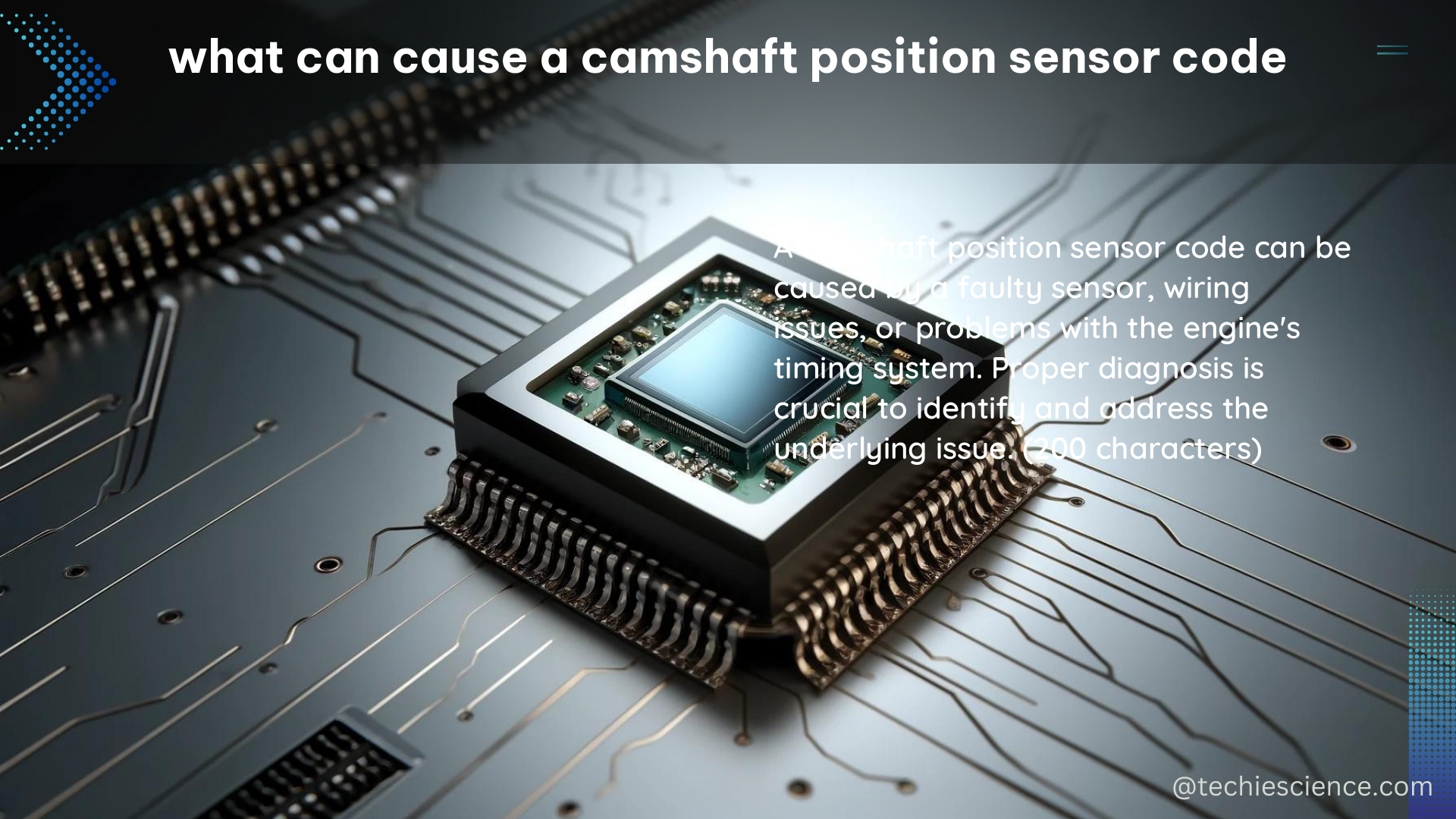The P0345 code is a diagnostic trouble code (DTC) that indicates an issue with the camshaft position sensor (CMP) circuit on bank 2 of the engine. This code is triggered when the powertrain control module (PCM) detects an inconsistent or missing signal from the CMP sensor, which is responsible for providing the PCM with information about the rotational position and speed of the camshaft. Without this critical data, the PCM cannot accurately control the ignition timing and fuel injection, leading to various drivability issues.
Faulty CMP Sensor
One of the most common causes of the P0345 code is a faulty or damaged CMP sensor. The CMP sensor is a Hall-effect or variable reluctance sensor that generates an electrical signal as the camshaft rotates. Over time, the sensor can wear out, become contaminated, or experience physical damage, causing it to send inconsistent or no signals to the PCM.
The CMP sensor typically has a voltage range of 4.5-5.5 volts and a resistance range of 1-2 kOhms. If the sensor is not within these specifications, it may trigger the P0345 code. To test the CMP sensor, you can use a multimeter to measure the voltage and resistance, and compare the readings to the manufacturer’s specifications.
Wiring Issues

Problems with the wiring between the CMP sensor and the PCM can also cause the P0345 code to be set. This can include damaged, corroded, or loose wiring, as well as open or shorted circuits. Inspect the wiring harness for any visible signs of damage and use a multimeter to check for continuity and proper voltage.
It’s important to note that the CMP sensor shares a circuit with the crankshaft position (CKP) sensor, and issues with the CKP sensor can also trigger the P0345 code. Ensure that the CKP sensor is also functioning correctly.
Timing Component Failures
Damaged or misaligned timing components, such as the timing chain, timing belt, or timing gears, can cause the camshaft to move out of sync with the crankshaft. This can result in the PCM detecting an inconsistent signal from the CMP sensor, leading to the P0345 code.
Inspect the timing components for any signs of wear, damage, or improper alignment. If any issues are found, the timing components may need to be repaired or replaced to resolve the P0345 code.
Powertrain Control Module (PCM) Failure
In rare cases, a faulty PCM can also cause the P0345 code to be set. The PCM is responsible for processing the signals from the CMP sensor and other engine sensors to control the engine’s operation. If the PCM is malfunctioning, it may incorrectly interpret the CMP sensor signal, triggering the P0345 code.
To diagnose a potential PCM issue, you can try replacing the PCM with a known good unit or having the PCM reprogrammed or reflashed by a professional technician.
Electrical System Issues
A weak or failing battery, as well as poor electrical connections, can also contribute to the P0345 code. The CMP sensor requires a stable and consistent power supply to function properly. If the battery voltage is low or there are issues with the electrical connections, the CMP sensor may not receive the necessary power, causing it to send inconsistent or no signals to the PCM.
Use a multimeter to check the battery voltage and the electrical connections to the CMP sensor. Addressing any issues with the electrical system may help resolve the P0345 code.
Diagnostic and Repair Procedure
To diagnose and fix the P0345 code, follow these steps:
- Check for other DTCs: Use a scan tool to check for any additional trouble codes that may be present, as they can provide valuable information about the root cause of the issue.
- Inspect the CMP sensor and wiring: Visually inspect the CMP sensor and the wiring harness for any signs of damage, corrosion, or loose connections.
- Test the CMP sensor: Use a multimeter or oscilloscope to test the CMP sensor for proper operation, ensuring that the voltage and resistance readings are within the manufacturer’s specifications.
- Check the electrical system: Use a multimeter to measure the battery voltage and check the electrical connections to the CMP sensor. Address any issues with the electrical system.
- Inspect the timing components: Examine the timing chain, timing belt, or timing gears for any signs of wear, damage, or misalignment.
- Test the PCM: If all other components check out, the PCM may be the source of the issue. Consider replacing the PCM or having it reprogrammed by a professional.
- Clear the DTCs: Once the issue has been resolved, clear the DTCs using a scan tool and test drive the vehicle to ensure the problem has been addressed.
Remember to always refer to the vehicle-specific repair manual for the correct diagnostic and repair procedures, as they may vary depending on the make, model, and year of the vehicle.
References:
– https://www.carparts.com/blog/code-p0340-camshaft-position-sensor-a-circuit-malfunction/
– https://www.kbb.com/obd-ii/p0340/
– https://www.justanswer.com/chevy/c3mkw-p0340-code-camshaft-position-sensor-changed.html
– https://g35driver.com/forums/g35-coupe-v35-2003-07/472825-camshaft-position-sensor-code.html
– https://www.carparts.com/blog/p0345-code-camshaft-position-sensor-a-circuit-bank-2/

The lambdageeks.com Core SME Team is a group of experienced subject matter experts from diverse scientific and technical fields including Physics, Chemistry, Technology,Electronics & Electrical Engineering, Automotive, Mechanical Engineering. Our team collaborates to create high-quality, well-researched articles on a wide range of science and technology topics for the lambdageeks.com website.
All Our Senior SME are having more than 7 Years of experience in the respective fields . They are either Working Industry Professionals or assocaited With different Universities. Refer Our Authors Page to get to know About our Core SMEs.